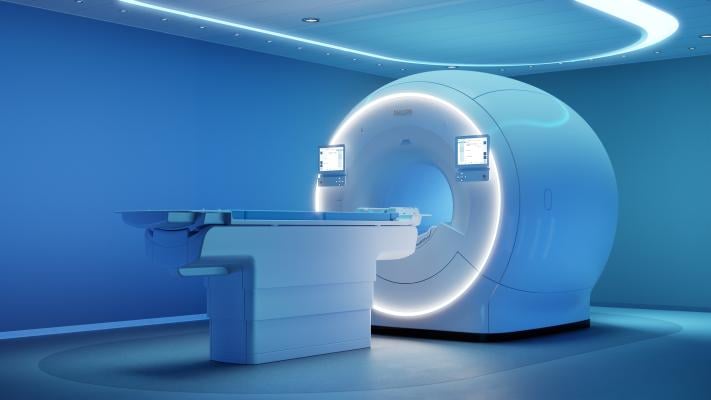
Nov. 21, 2024 — Royal Philips plans to unveil its next-generation 1.5T BlueSeal MR wide-bore scanner at RSNA 2024 in Chicago, Dec. 1-4. The latest generation scanner features a 70 cm wide-bore design and integrates AI-enabled MR Smart Workflow solutions, designed to enhance access and diagnostic confidence to improve outcomes for more patients. The MR Smart Workflow solutions increase daily patient throughput without compromising diagnostic quality to address the needs of high-demand healthcare environments.
The scanner incorporates Philips’ unique Smart Reading technology, a cloud-based AI toolset that integrates imaging and reading on the MR scanner. In partnership with computer-aided diagnostics company icometrix (Leuven, Belgium) for neurological indications like Alzheimer’s and Multiple Sclerosis, and imaging biomarker specialist Quibim for prostate cancer, Smart Reading drives precision diagnosis by providing fully automated AI-based quantitative reports.
The eco-friendly design of the BlueSeal MRI with helium-free operations, makes it the lightest 1.5T 70cm MRI system available today [4]. Up to 1700 kg lighter [4] and does not require a vent pipe, it enables flexible installations in new locations, including elevated floors or indoor sites with construction limitations, bringing quality MRI to more patients, where helium logistics are challenging or costly.
“We have installed more than 1,500 BlueSeal systems globally in wide-ranging settings including the world’s first helium-free mobile MRI units. With AI applications seamlessly integrated into our latest 1.5T BlueSeal scanner, we have now applied AI to every aspect of the MRI workflow – from patient set-up and high-resolution image capture to quantitative data extraction, advanced diagnostics, and reporting,” said Ioannis Panagiotelis, PhD, Global Business Leader MRI at Philips.
Using Philips BlueSeal technology, MRT Praxis Potsdam in Germany, has realized an increase in patient throughput from 32-35 to 40 patients per day [5].
AI-enabled workflow, planning and image acquisition
In fast-growing areas such as neurology, oncology and cardiology where MRI is an important tool, improving patient outcomes requires the acquisition of more diagnostic information without compromising scan time and efficiency or adding complexity. Seamlessly integrated into Philips’ new wide-bore BlueSeal MR system, the company’s Smart Workflow planning and image acquisition solution uses AI to support technologists through every step of the MRI process, from scheduling to patient set-up. This suite of AI-enabled workflow solutions delivers fast, consistent and precise imaging, to help maximize efficiency and enhance diagnostic confidence.
Key components include:
- SmartExam automates MRI exam planning, scanning, and processing for up to 80% of procedures [6], ensuring consistency and reproducibility in imaging outcomes;
- SmartFit coils give technologists freedom to position the ultra-lightweight coils with flexible bending greater than 90 degrees, while taking patient comfort to the next level [7];
- SmartSpeed offers up to 65% higher image resolution [3] without added scan time, or up to three times faster scans [3] and is compatible with 97% of clinical protocols [8];
- SmartQuant AI-enhanced quantitative MR solution generates fast, high-quality, quantitative MR images for multiple anatomies including brain, spine, MSK, liver and heart to generate more objective diagnostic information in very short scan times;
- SmartReading’s unique integration of imaging and reading capabilities on the MR scanner enables fully automated 0-click [9] generation of AI-based quantitative reports.
BlueSeal MR
Preloaded with only 7 liters of helium – which never needs refilling – Philips has saved nearly 2.75 million liters to date [10]. The 7 liters in a BlueSeal scanner also has a high thermal capacity to keep the magnet cold and super conductive for more than 4 hours in the event of a power outage [11]. Philips BlueSeal MRI systems are also designed to minimize vital energy consumption and reduce a center’s carbon footprint, helping to meet both financial and environmental goals by saving nearly 40mWh in energy per year.
The next generation Philips BlueSeal 1.5T will be demonstrated in the Philips booth (#6730) at RSNA 2024. Visit Philips at RSNA for more information.
[1] Helium-free operations. 7 liters of helium is permanently enclosed in the cryogenic circuit.
[2] Adaptive-C-SENSE-Net technology is the winner of the FastMRI Challenge hosted by Facebook AI Research and NYU Langone Health (2019).
[3] Compared to Philips SENSE imaging.
[4] Compared to conventional 1.5T zero boil off systems in the industry BlueSeal MR system weight (with cryogen) 2,300 kg (5,071 lbs).
[5] Results from case studies are not predictive of results in other cases. Results in other cases may vary.
[6] SmartExam is not available to patients with MR Conditional Implants.
[7] 1.5T SmartFit TorsoCardiac
[8] On average, measured across a sample of sites from Philips MR Installed Base.
[9] 0-click workflow refers to steps after completion of data-acquisition to AI processing. No additional user-interaction is required to send data to the External application cloud and to receive reports in PACS.
[10] The amount of liquid helium saved is a calculation compared to a classic magnet with 1500 liters of helium.
[11] On average, determined based on actual installed-base data. Results may vary per system.


 July 25, 2024
July 25, 2024 








